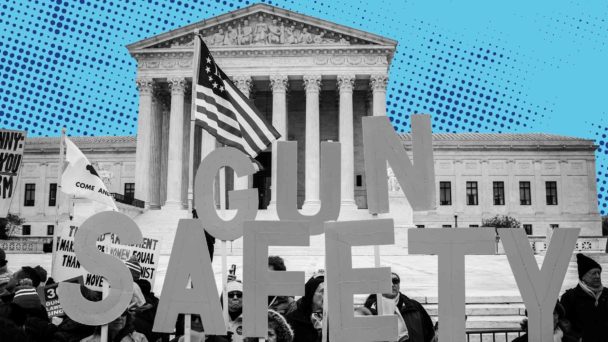Last week, in an 8-1 opinion written by Chief Justice John Roberts, the Supreme Court decided United States v. Rahimi, upholding a federal law that disarms domestic violence offenders subject to restraining orders. But almost every justice had a little something extra they wanted to say, too: Justice Sonia Sotomayor wrote a concurrence, joined by Justice Elena Kagan, criticizing the originalist test for Second Amendment cases devised by the Court in New York State Rifle & Pistol Association v. Bruen two years ago. And Justices Neil Gorsuch, Brett Kavanaugh, and Amy Coney Barrett all wrote separate concurrences defending their visions of originalism, proclaiming their fealty to Bruen’s standard despite quietly backing away from it in the majority opinion.
Justice Ketanji Brown Jackson, who also wrote a solo concurring opinion, chose a different path. Jackson’s concurrence called on the Court to “be mindful of how its legal standards are actually playing out in real life,” and reminded her colleagues of their responsibilities to other judges, lawmakers, and the public. She observed that “we now have two years’ worth of post-Bruen cases under our belts,” and can see the havoc that it wrought. In Jackson’s view, this experience “should bear on our assessment of the workability of that legal standard.”
Supreme Court justices sometimes seem to live in their own little world, comfortably insulated from the idea that their actions could have negative consequences outside of their courtroom. For example, in both Bruen and Garland v. Cargill, another recent case implicating America’s gun violence crisis, Justice Samuel Alito rolled his eyes at his dissenting colleagues’ suggestions that the staggering rates of gun violence—and the politically accountable branches’ efforts to do something about it—might be even a little relevant to the Court’s Second Amendment jurisprudence. Jackson’s concurrence departs from that mold and underscores that the Court’s decisionmaking does not occur in a vacuum. People live with the Court’s rulings, and can die because of them, too.
Jackson’s concurrence thoroughly engages with the post-Bruen reality of lower court judges tasked with applying the Court’s precedent. In Bruen, Justice Clarence Thomas declared that gun laws are legally suspect unless they are “consistent with this Nation’s historical tradition of firearm regulation”; in Rahimi, Jackson provided a dozen examples of judges explicitly begging the Court to clarify what that actually means. Judges don’t know just how analogous a modern gun law must be to a historical one in order to pass constitutional muster, so cases have been reaching divergent, unpredictable results. Jackson also pointed out that lower court judges already have “heavier caseloads and fewer resources,” and that now, because of Bruen, they’re forced to add “service as amateur historians” to their list of responsibilities.
Jackson emphasized that other judges are “stakeholders” in the Court’s opinions, and urged the Court to take responsibility for letting their lower court colleagues down: “The blame may lie with us, not with them,” she wrote.
Next, Jackson turned to the struggles Bruen causes for legislators trying to protect their constituents from gun violence. This is a concern she first surfaced during oral arguments in Rahimi last fall, which were held less than two weeks after a gunman killed 18 people in a mass shooting in Lewiston, Maine. “Let’s say I’m a legislator today in Maine, for example, and I’m very concerned about what has happened in that community,” she began. “My people, the constituents, are asking me to do something.”
Yet under Bruen, Jackson argued, “step one” for lawmakers is to “go to the archives and try to determine whether or not there’s some historical analogue for the kinds of legislation that I’m considering.” Jackson echoed this theme in her Rahimi concurrence, writing that Bruen “stifles both helpful innovation and democratic engagement” and is “limiting legislative solutions” while forcing people who are untrained as professional historians to identify and assess “troves of centuries-old documentation.”
Finally, Jackson discussed the public. The Court has long presented itself to the people as the cool, calm, and collected guardian of the law, yet its jurisprudence is a hot mess. Jackson raised the very basic concern that, as a result, normal people have no idea what’s going on with the state of their nation’s gun laws: “The public, too, deserves clarity when this Court interprets our Constitution,” she wrote. In place of clarity, the Court has created chaos.
Jackson will have her work cut out for her, as Rahimi does not appear to have provided the kind of clarity that Roberts and company perhaps imagined. Yesterday, the Department of Justice filed a brief asking the Court to review several constitutional challenges to a federal law banning gun possession for people with felony convictions, which several lower courts had struck down under Bruen. According to the DOJ, “Rahimi corrects some of the methodological errors” made by these lower courts, but “is unlikely to fully resolve the existing conflict” between different courts over the law’s constitutionality. In other words, the Court’s ruling in Rahimi didn’t actually clean up much from Bruen, and everyone else is still dealing with its mess.
The people responsible for making and enforcing laws are continuing to tell the Court that its rulings just aren’t working. The jury’s still out on whether the Court will listen.






